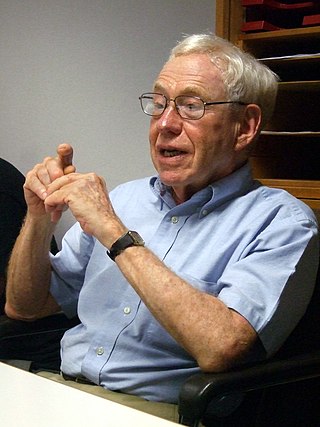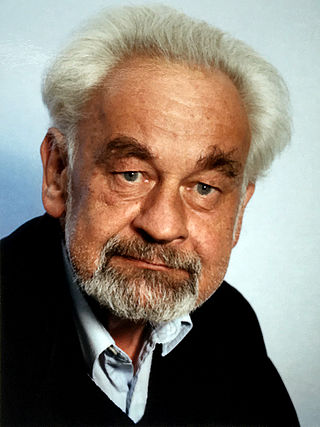Related Research Articles

Edmund Gustav Albrecht Husserl was an Austrian-German philosopher and mathematician who established the school of phenomenology.

Phenomenology is the philosophical study of objectivity and reality as subjectively lived and experienced.

Alfred Schutz was an Austrian philosopher and social phenomenologist whose work bridged sociological and phenomenological traditions. Schutz is gradually being recognized as one of the 20th century's leading philosophers of social science. He related Edmund Husserl's work to the social sciences, using it to develop the philosophical foundations of Max Weber's sociology, in his major work Phenomenology of the Social World. However, much of his influence arose from the publication of his Collected Papers in the 1960s.
Experience refers to conscious events in general, more specifically to perceptions, or to the practical knowledge and familiarity that is produced by these processes. Understood as a conscious event in the widest sense, experience involves a subject to which various items are presented. In this sense, seeing a yellow bird on a branch presents the subject with the objects "bird" and "branch", the relation between them and the property "yellow". Unreal items may be included as well, which happens when experiencing hallucinations or dreams. When understood in a more restricted sense, only sensory consciousness counts as experience. In this sense, experience is usually identified with perception and contrasted with other types of conscious events, like thinking or imagining. In a slightly different sense, experience refers not to the conscious events themselves but to the practical knowledge and familiarity they produce. In this sense, it is important that direct perceptual contact with the external world is the source of knowledge. So an experienced hiker is someone who actually lived through many hikes, not someone who merely read many books about hiking. This is associated both with recurrent past acquaintance and the abilities learned through them.

Max Ferdinand Scheler was a German philosopher known for his work in phenomenology, ethics, and philosophical anthropology. Considered in his lifetime one of the most prominent German philosophers, Scheler developed the philosophical method of Edmund Husserl, the founder of phenomenology. Given that school's utopian ambitions of re-founding all of human knowledge, Scheler was nicknamed the "Adam of the philosophical paradise" by José Ortega y Gasset.

Hubert Lederer Dreyfus was an American philosopher and professor of philosophy at the University of California, Berkeley. His main interests included phenomenology, existentialism and the philosophy of both psychology and literature, as well as the philosophical implications of artificial intelligence. He was widely known for his exegesis of Martin Heidegger, which critics labeled "Dreydegger".
Neurophenomenology refers to a scientific research program aimed to address the hard problem of consciousness in a pragmatic way. It combines neuroscience with phenomenology in order to study experience, mind, and consciousness with an emphasis on the embodied condition of the human mind. The field is very much linked to fields such as neuropsychology, neuroanthropology and behavioral neuroscience and the study of phenomenology in psychology.

Dietrich Richard Alfred von Hildebrand was a German Roman Catholic philosopher and religious writer.

Lifeworld may be conceived as a universe of what is self-evident or given, a world that subjects may experience together. The concept was popularized by Edmund Husserl, who emphasized its role as the ground of all knowledge in lived experience. It has its origin in biology and cultural Protestantism.
Phenomenology or phenomenological psychology, a sub-discipline of psychology, is the scientific study of subjective experiences. It is an approach to psychological subject matter that attempts to explain experiences from the point of view of the subject via the analysis of their written or spoken words. The approach has its roots in the phenomenological philosophical work of Edmund Husserl.

Dan Zahavi is a Danish philosopher. He is currently a professor of philosophy at University of Copenhagen.
Dermot Moran is an Irish philosopher specialising in phenomenology and in medieval philosophy, and he is also active in the dialogue between analytic and continental philosophy. He is currently the inaugural holder of the Joseph Chair in Catholic Philosophy at Boston College. He is a member of the Royal Irish Academy and a founding editor of the International Journal of Philosophical Studies.
The Society for Phenomenology and Existential Philosophy (SPEP) is a philosophical society whose initial purpose was to promote the study of phenomenology and existentialism but has since expanded to a wide array of contemporary philosophical pursuits, including critical theory, feminist philosophy, poststructuralism, critical race theory, and increasingly non-Eurocentric philosophies. SPEP was created in 1962 by American philosophers who were interested in Continental philosophy and were dissatisfied with the analytic dominance of the American Philosophical Association. It has since emerged as the second most important philosophical society in the United States. Alan D. Schrift and Shannon Sullivan are the current Executive Co-Directors of SPEP.
Buddhist thought and Western philosophy include several parallels.
Peter Poellner is a professor of philosophy at the University of Warwick. is research interests include phenomenology, philosophy of value, philosophy of mind, Husserl, Nietzsche.

Edward S. Casey is an American philosopher and university professor. He has published several volumes on phenomenology, philosophical psychology, and the philosophy of space and place. His work is widely cited in contemporary continental philosophy. He is currently Distinguished Professor Emeritus of Philosophy at Stony Brook University in New York and distinguished visiting faculty at Pacifica Graduate Institute.

Thomas Seebohm was a phenomenological philosopher whose wide-ranging interests included, among others, Immanuel Kant, Edmund Husserl, hermeneutics, and logic. Other areas of Professor Seebohm's interests included the history of philosophy, philosophy of history, philosophy of the formal sciences, methodology and philosophy of the human sciences, the history of 19th century British Empiricism, American pragmatism, analytic philosophy, philosophy of law and practical philosophy, and the development of the history of philosophy in Eastern Europe. Despite this diverse span of interests, Seebohm was chiefly known as a phenomenologist, who "above all...considered himself a creative phenomenologist, who as a critically reflecting philosopher would look at all major issues with which he became confronted, from a transcendental phenomenological point of view."
David Carr is an American phenomenology scholar and a Charles Howard Candler Professor Emeritus of Philosophy from Emory University.
Chad Anthony Engelland is an American philosopher and Professor of Philosophy at the University of Dallas. He is known for his research on the ideas of German philosopher Martin Heidegger. Engelland is a former editor-in-chief of Xavier Newswire (1998–1999).
Elmar Holenstein is a Swiss philosopher with research interests in the fields of philosophical psychology, philosophy of language and cultural philosophy.
References
- ↑ "Professor Anthony J. Steinbock". Phenomenology Research Center . Retrieved 31 July 2018.
- ↑ "Moral Emotions: Reclaiming the Evidence of the Heart. By Anthony J. Steinbock" (PDF). Perspectives. International Postgraduate Journal of Philosophy . 6 (1): 58–60. 2016. Retrieved 4 August 2018.
- ↑ Drummond, John J. (6 November 2014). "Review of Moral Emotions: Reclaiming the Evidence of the Heart". Notre Dame Philosophical Reviews. ISSN 1538-1617 . Retrieved 4 August 2018.
- ↑ Soffer, Gail (1997). "Anthony Steinbock: Home and Beyond: Generative Phenomenology After Husserl". Husserl Studies . 14 (2): 153–160. doi:10.1023/A:1005925323781. S2CID 169936066 . Retrieved 4 August 2018.